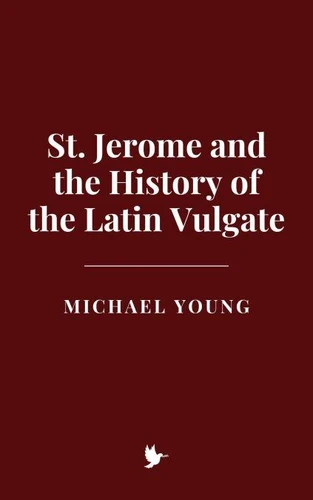St. Jerome and the History of the Latin Vulgate
Par :Formats :
Disponible dans votre compte client Decitre ou Furet du Nord dès validation de votre commande. Le format ePub est :
- Compatible avec une lecture sur My Vivlio (smartphone, tablette, ordinateur)
- Compatible avec une lecture sur liseuses Vivlio
- Pour les liseuses autres que Vivlio, vous devez utiliser le logiciel Adobe Digital Edition. Non compatible avec la lecture sur les liseuses Kindle, Remarkable et Sony
 , qui est-ce ?
, qui est-ce ?Notre partenaire de plateforme de lecture numérique où vous retrouverez l'ensemble de vos ebooks gratuitement
Pour en savoir plus sur nos ebooks, consultez notre aide en ligne ici
- FormatePub
- ISBN8230712640
- EAN9798230712640
- Date de parution16/01/2025
- Protection num.pas de protection
- Infos supplémentairesepub
- ÉditeurIndependently Published
Résumé
The life and work of St. Jerome stand as a monumental chapter in the history of Christianity and its intellectual tradition. To understand the significance of his achievements, particularly the creation of the Latin Vulgate Bible, one must delve into the historical, theological, and cultural contexts that shaped both the man and his work. Jerome's Hebrew studies would prove pivotal in his later work.
While Greek was the lingua franca of early Christian theology, and the Septuagint (a Greek translation of the Hebrew Bible) was widely used in the Church, Jerome's decision to engage with the original Hebrew texts demonstrated his commitment to textual accuracy. This decision, however, placed him at odds with many of his contemporaries, who viewed the Septuagint as divinely inspired. Jerome's insistence on returning to the source material was not merely a scholarly endeavor; it reflected his belief that the Scriptures were the foundation of Christian faith and doctrine, and that any deviation from their original meaning could lead to theological error.
While Greek was the lingua franca of early Christian theology, and the Septuagint (a Greek translation of the Hebrew Bible) was widely used in the Church, Jerome's decision to engage with the original Hebrew texts demonstrated his commitment to textual accuracy. This decision, however, placed him at odds with many of his contemporaries, who viewed the Septuagint as divinely inspired. Jerome's insistence on returning to the source material was not merely a scholarly endeavor; it reflected his belief that the Scriptures were the foundation of Christian faith and doctrine, and that any deviation from their original meaning could lead to theological error.
The life and work of St. Jerome stand as a monumental chapter in the history of Christianity and its intellectual tradition. To understand the significance of his achievements, particularly the creation of the Latin Vulgate Bible, one must delve into the historical, theological, and cultural contexts that shaped both the man and his work. Jerome's Hebrew studies would prove pivotal in his later work.
While Greek was the lingua franca of early Christian theology, and the Septuagint (a Greek translation of the Hebrew Bible) was widely used in the Church, Jerome's decision to engage with the original Hebrew texts demonstrated his commitment to textual accuracy. This decision, however, placed him at odds with many of his contemporaries, who viewed the Septuagint as divinely inspired. Jerome's insistence on returning to the source material was not merely a scholarly endeavor; it reflected his belief that the Scriptures were the foundation of Christian faith and doctrine, and that any deviation from their original meaning could lead to theological error.
While Greek was the lingua franca of early Christian theology, and the Septuagint (a Greek translation of the Hebrew Bible) was widely used in the Church, Jerome's decision to engage with the original Hebrew texts demonstrated his commitment to textual accuracy. This decision, however, placed him at odds with many of his contemporaries, who viewed the Septuagint as divinely inspired. Jerome's insistence on returning to the source material was not merely a scholarly endeavor; it reflected his belief that the Scriptures were the foundation of Christian faith and doctrine, and that any deviation from their original meaning could lead to theological error.























